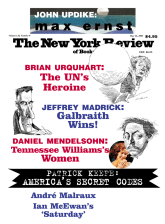To the Editors:
Amos Elon showed his usual sensitivity and deep empathy in his review of Amos Oz’s latest book, A Tale of Love and Darkness [NYR, December 16, 2004]. But I feel he missed a major point, which endows the book with an extra tragic dimension which does not come through in Elon’s review and is the bedrock on which the elegiac tone of the story is based.
Reading Elon’s review, one is left wondering what the “Love” in the book’s title refers to. Elon brings out starkly the “Darkness”—in the personal fate of the Klausner-Oz family, in the grim and shabby circumstances Oz’s parents found themselves in in Palestine which was far from what they must have hoped the Promised Land would be. Elon also dwells—with compassion and humor—on the incongruity between the life circumstances of the circle of Oz’s parents in Kerem Avraham in Jerusalem and their relentless disputations about European writers, thinkers, and political movements. But it is here that he misses the point of the novel.
For it is this love for Europe—its literature and philosophy, its arts and movements of social and human emancipation, its Enlightenment and promise of salvation—which is the moral and intellectual legacy which these Jewish literati imbibed from Europe: and the tragedy is that this love remained unrequited. In the Tarbut Hebrew schools in Eastern Europe they were nurtured on the heady concoction of the European Enlightenment—and their deep disappointment was not only that it was so difficult to live up to these ideals in 1930s Jerusalem—but that Europe itself, which they loved and whose ideals they had so enthusiastically embraced—betrayed them and its own promise.
This is why they endured the hardships of pre-1948 Palestine—not out of a naive or jingoistic Jewish nationalism, but because they realized that the great hope and promise—their love affair with Europe—has ended so disastrously. Where but in Jerusalem—or Tel Aviv or Haifa—could one seriously discuss in 1942 (!) Schiller, Goethe, Mickiewicz, and Tolstoy? This is also why Amos Oz researches and recalls with minute and loving detail the stories of members of his parents’ families who stayed in Europe: no, they did not suffer the humiliations of a Jerusalem slum—they perished in the Holocaust.
Amos Oz’s book is not about the Holocaust, nor is it a simplistic paean to Zionism. It is an elegy for Europe, the avatar of Love—and Darkness.
Shlomo Avineri
Department of Political Science
The Hebrew University
Jerusalem
Amos Elon replies:
I thought I had made this very point in my review of Oz’s memoir and am grateful for this opportunity to reemphasize it. Still, I find it difficult to understand why Avineri dismisses the bizarre jingoism of Oz’s family as irrelevant. Oz certainly doesn’t. On the contrary, his memoir comes to an emotional climax at the moment he frees himself from his father’s politics.
The tragedy of Israel is that in the heady aftermath of a war ominously named after the Six Days of Creation, these politics were adopted by successive Israeli governments.
This Issue
May 26, 2005



